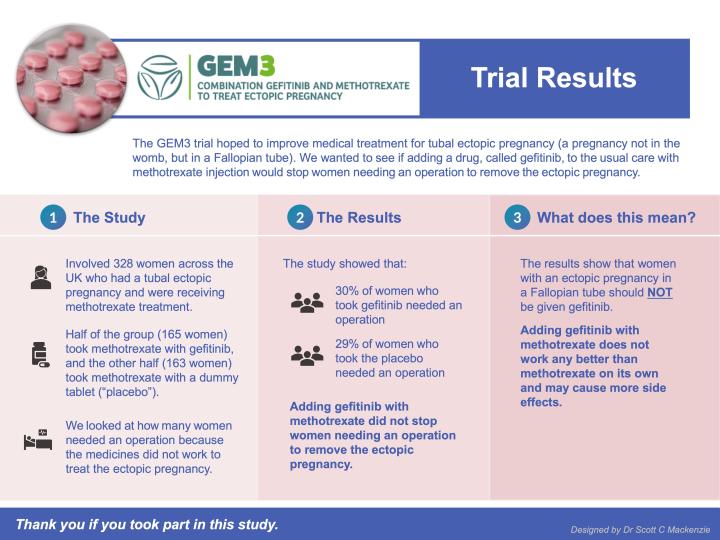CRH researchers publish the largest clinical trial on ectopic pregnancy
The largest clinical trial on ectopic pregnancy to date was published in the Lancet on 2 February 2023 with an accompanying commentary.
The paper reported the eagerly awaited results of the UK-wide GEM3 trial assessing whether combination treatment with gefitinib and methotrexate was better than standard treatment with methotrexate alone to manage an ectopic pregnancy. Sadly, the trial showed that there is no benefit of combining gefitinib with methotrexate.
However, the trial has generated important data which will be useful to counsel patients with an ectopic pregnancy trying to decide whether to opt for methotrexate treatment, or surgery. It is anticipated that the findings will be rapidly incorporated into international early pregnancy guidelines.
The trial shows that:
- Ectopic pregnancies treated with a single dose of intramuscular methotrexate take an average of 28 days to resolve.
- After treatment with methotrexate, 14% of patients will require a second dose.
- 29% of patients end up requiring surgery, despite treatment with methotrexate.
- Patients treated with methotrexate are generally very satisfied with this treatment approach.


Ectopic pregnancies remain a killer of young women, especially in low and low-middle income settings. They are worryingly frequent - 1-2% pregnancies are ectopic – and their prevalence is rising. Importantly, their management involves a wide range of medical professionals including GPs, specialists in emergency medicine, obstetricians and gynaecologists, radiologists, pharmacologists, clinical psychologists, midwives and nurses. Yet, interest in this common, life-endangering condition among general medical (or scientific) journals appears surprisingly low.
Professor Andrew Horne, from the MRC Centre for Reproductive Health at the University of Edinburgh, who led the GEM3 trial, hopes that the publication of the trial results will raise awareness of ectopic pregnancy and encourage further large-scale research on the condition.
“Ectopic pregnancy is still the commonest cause of death in early pregnancy and, even if not fatal, the effects are distressing and far reaching. Women can suffer from long term psychological problems, and it can impact on their future fertility. If an ectopic pregnancy is diagnosed early, it is likely it can be treated effectively and perhaps avoiding the need for invasive surgery. That’s why it’s important that there is more research like our trial into ways that we can improve the medical management of the condition.”

